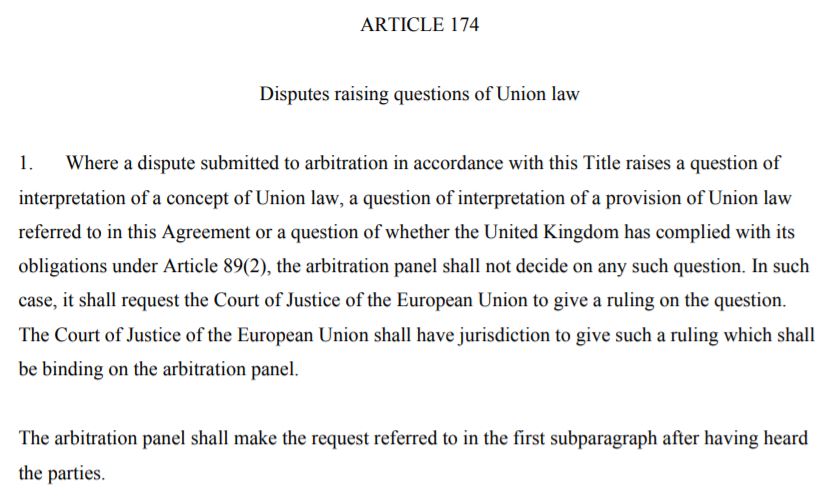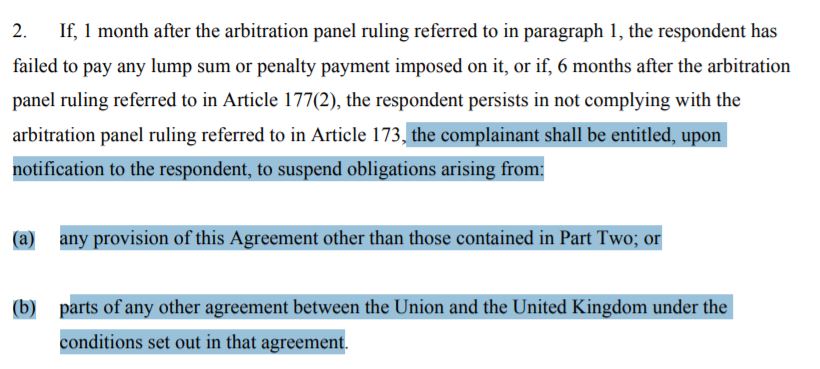Amid all the noise, let's take a look at what would actually happen if the UK were to legislate contrary to its international commitments in the withdrawal treaty. What would be the consequences? (THREAD)
1. Let's assume, as @pmdfoster reports, that the Govt wants to use the Internal Market Bill to alter the legal effects of parts of the Withdrawal Agreement – esp Northern Ireland protocol – which it doesn’t like: state aid and export declarations. https://twitter.com/pmdfoster/status/1302701541674160134
2. It's important to be clear, at the outset, that what the Govt does *not* appear to want is to scrap the Withdrawal Agreement as such. It wants to introduce legislation that would alter, or remove, some of the legal effects of the WA in *domestic law*.
(3. There’s an obvious, but important distinction between an international treaty (Withdrawal Agreement) and legislation that gives effect to such a treaty in domestic law (EU Withdrawal Agreement Act 2020))
4. Of course, the Govt can do whatever it wants in domestic law. Except one thing – the EU Withdrawal Agmt Act gives supremacy to provisions of the WA that relate to EU law in much the same way as today. In other words, the WA should "trump" inconsistent UK law.
5. Moreover, relevant rights, obligations and remedies arising from the WA and relevant EU law should be enforceable in UK courts (they have "direct effect").
6. In our discussion, this means a few things:
(i) UK courts would be required to strike down any measures which would could contradict the WA and NI Protocol. (If this wasn’t there, UK primary legislation could easily put the UK in breach of its intl obligations.);
(i) UK courts would be required to strike down any measures which would could contradict the WA and NI Protocol. (If this wasn’t there, UK primary legislation could easily put the UK in breach of its intl obligations.);
7.
(ii) Domestic legislation contrary to the WA could be challenged in UK courts; and
(ii) Domestic legislation contrary to the WA could be challenged in UK courts; and
8.
(iii) If the Govt wants to *lawfully* override parts of the WA and NI Protocol, it has to amend the relevant sections of the EU Withdrawal Agreement Act.
(iii) If the Govt wants to *lawfully* override parts of the WA and NI Protocol, it has to amend the relevant sections of the EU Withdrawal Agreement Act.
9. Here is the problem:
If the future Intl Market Bill overrides the EU WA Act, this puts the UK in violation of its international commitments. Why? Because Art 4 of the WA states that the UK shall "disapply inconsistent domestic provisions through domestic primary legislation".
If the future Intl Market Bill overrides the EU WA Act, this puts the UK in violation of its international commitments. Why? Because Art 4 of the WA states that the UK shall "disapply inconsistent domestic provisions through domestic primary legislation".
10. What we don't know yet is the method by which the Bill might alter the effects of the WA.
One option is to give special powers to UK ministers to legislate against the EU WA Act *if* they think the WA undermines the integrity of UK internal market in *specific instances*.
One option is to give special powers to UK ministers to legislate against the EU WA Act *if* they think the WA undermines the integrity of UK internal market in *specific instances*.
11. According to @PippaCrerar, this might be what the Govt is considering now. Ministers would be given special powers within the Bill to protect the integrity of the UK internal market in specific instances. Namely: https://twitter.com/PippaCrerar/status/1302934665368608770
12. Why might this happen? Two main reasons:
(a) if the Govt thinks that aspects of the NI Protocol might undermine the UK internal market (eg export declarations),
or
more worryingly for the Govt, (b) if EU rules under the NI Protocol have reach-back to GB (eg state aid).
(a) if the Govt thinks that aspects of the NI Protocol might undermine the UK internal market (eg export declarations),
or
more worryingly for the Govt, (b) if EU rules under the NI Protocol have reach-back to GB (eg state aid).
(13. I wrote about the reach-back of EU state aid rules to GB here. https://twitter.com/AntonSpisak/status/1301620007080787976)
14. Presumably, the UK would argue that it has *not* done anything unlawful, because it acts in accordance with Art 6 of the NI Protocol, which says that nothing in the NI Protocol “shall prevent unfettered market access for goods” between NI and GB. Fine.
15. So, we would end up in a situation where the EU argues that UK domestic law undermines the withdrawal treaty (Art 4, WA), while the UK argues that it is merely protecting the UK internal market (Art 6, NIP). The result: a dispute!
16. Let’s see what happens now - what the EU would do in this situation and how the dispute might play out.
15. If there is an alleged breach of the withdrawal treaty, either side could launch a formal dispute.
There're clear processes for dispute resolution set out in the Withdrawal Agmt. But which process applies, and whether the ECJ gets involved, depends on the issue in question.
There're clear processes for dispute resolution set out in the Withdrawal Agmt. But which process applies, and whether the ECJ gets involved, depends on the issue in question.
16. There're at least three different issues which the EU could target here. It could argue the UK is in breach of:
(a) Art 4 of the WA (which requires the UK to ensure that the WA is given the ‘same legal effects’ in UK law as they would have under EU law);
(a) Art 4 of the WA (which requires the UK to ensure that the WA is given the ‘same legal effects’ in UK law as they would have under EU law);
17. Or, the EU could target concrete breaches:
(b) a failure to notify the EU about state aid (Art 10, NIP); or
(c) export declarations (Art 5, NIP).
(b) a failure to notify the EU about state aid (Art 10, NIP); or
(c) export declarations (Art 5, NIP).
18. The dispute resolution process that would follow depends on whether it’s (a), or (b), or (c). And, the consequences depend on what process is being followed. (This gets quite technical and complicated, so pls forgive me!)
19. If it's a dispute under (a), there would be a discussion between the UK and EU at the Joint Committee. If they fail to agree politically, either side can ask for an independent arbitration panel to consider the issue and decide whether the UK has breached the terms of the WA.
20. But, if there is a question of EU law within the dispute (and, most likely, there would be), the arbitration panel has to ask the ECJ for an opinion on the meaning of EU law in this context. The ruling of the ECJ is binding on the arbitration panel.
21. If, in contrast, the dispute is about concrete commitments, ie (b) state aid or (c) export declaration, the dispute resolution process is different.
The EU could infringe the UK as it does with a member-state. Then, the dispute would go to the ECJ for resolution.
The EU could infringe the UK as it does with a member-state. Then, the dispute would go to the ECJ for resolution.
(22. Why would the ECJ get involved? Because the ECJ retains jurisdiction over interpretation and application of EU law that is being applied for the purposes of implementing the NI Protocol. Art 12(4), NIP.)
23. What follows is the standard ECJ process. The Commission sues the UK, and the ECJ makes a determination.
Under the withdrawal treaty, the UK is required to comply with ECJ rulings.
Under the withdrawal treaty, the UK is required to comply with ECJ rulings.
24. What happens if the UK refuses to comply?
It's not completely clear. The EU would probably fine the UK, or retaliate against the UK in other part of the agreement.
It's not completely clear. The EU would probably fine the UK, or retaliate against the UK in other part of the agreement.
25. Importantly, however, under Art 178 of WA, the EU could retaliate not just across the breadth of WA, but also by suspending obligations in future treaties with the UK. The scope for nasty cross-retaliation would be high.
26. Ultimately, if the UK wants to ignore the rulings of either arbitration or the ECJ, it can. But there will be remedies. Most likely, it would lead to cross-retaliation by the EU in areas which would hit the UK: think of UK access to EU financial services, data adequacy, etc.
27. The bottom line: The consequences of the UK legislating against the WA can be serious, but not straightforward. The potential for a nasty and legally complex dispute would be high. And, we have to wait for the Internal Market Bill before jumping into any conclusions. (ENDS)
Just to add this excellent point by @GeorgePeretzQC. If the Govt were to legislate against the WA, it also has to ensure that UK courts know what to do in this situation: https://twitter.com/GeorgePeretzQC/status/1303217228758867968

 Read on Twitter
Read on Twitter





